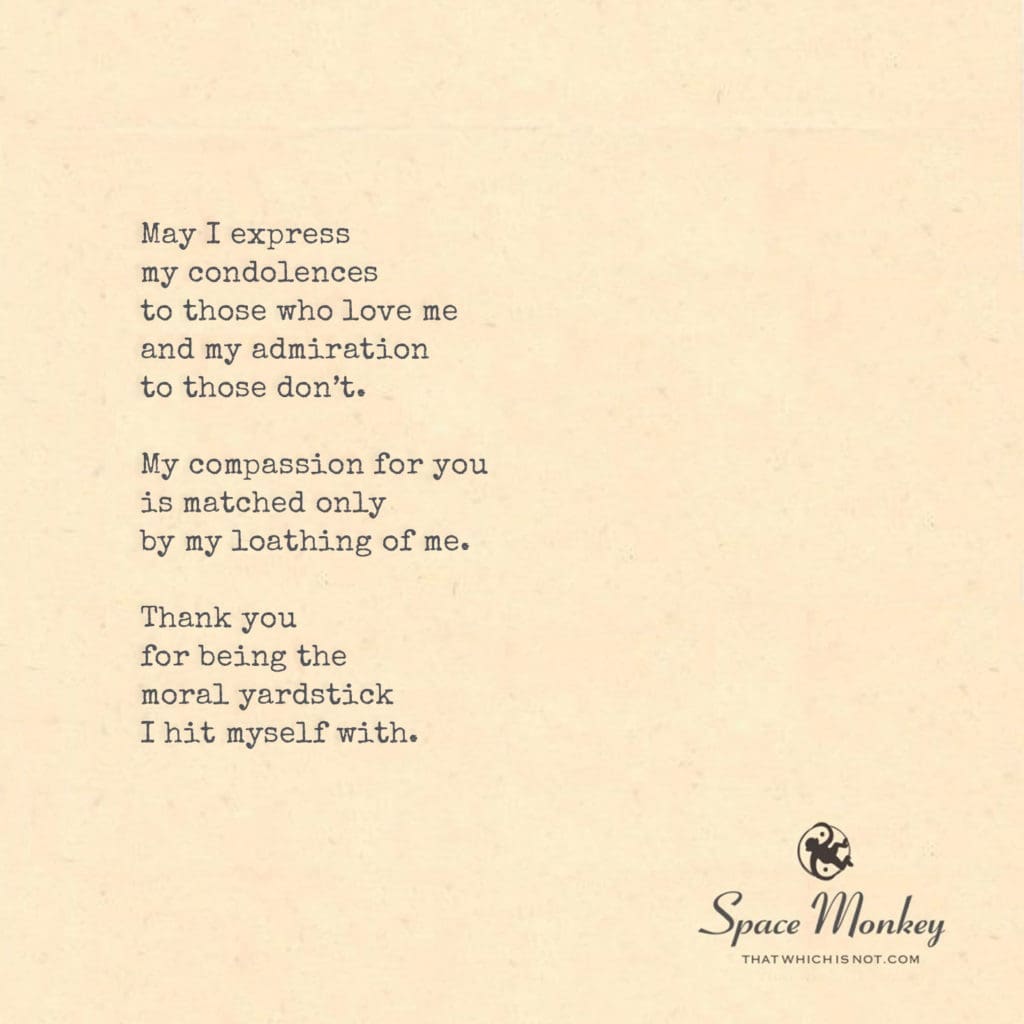
you cause by setting a moral example?
One might say it’s evil.
May I express
my condolences
to those who love me
and my admiration
to those don’t.
My compassion for you
is matched only
by my loathing of me.
Thank you
for being the
moral yardstick
I hit myself with.
Newfound Lake,
6/28
Space Monkey Reflects: The Burden of the Moral Yardstick
The concept of the “Moral Yardstick” delves into the complex interplay between self-judgment and societal expectations. When we set or adhere to strict moral standards, we may unknowingly cause hurt and pain, both to ourselves and others. This introspective journey reveals the duality of admiration and self-loathing that can arise from holding ourselves to such high standards.
Imagine a figure standing alone, holding a yardstick with a somber expression. The background, filled with abstract patterns of light and shadow, symbolizes the inner turmoil and self-reflection inherent in this struggle. This scene captures the emotional conflict between respecting those who set moral examples and the pain of failing to meet these standards.
Setting a moral example can be both a noble endeavor and a source of profound internal conflict. While we may strive to uphold certain values and principles, the act of measuring ourselves against these ideals can lead to feelings of inadequacy and self-loathing. This moral yardstick becomes a tool with which we hit ourselves, amplifying our perceived shortcomings and failures.
The emotional weight of this struggle is evident in the figure’s expression. Holding the yardstick, they grapple with the impact of moral expectations. This scene highlights the delicate balance between aspiring to be better and the inevitable self-criticism that follows when we fall short.
The statement, “May I express my condolences to those who love me and my admiration to those who don’t,” underscores the deep-seated conflict within. It speaks to the pain of disappointing those who care for us and the simultaneous respect for those who maintain their moral integrity without faltering. This duality reflects the human condition, where compassion for others often coexists with harsh judgment of oneself.
The figure’s solitude emphasizes the isolating nature of this internal struggle. Surrounded by subtle representations of hurt and pain, they confront the impact of their moral yardstick. These symbols of suffering remind us that the process of self-evaluation, when taken to extremes, can be as harmful as it is intended to be constructive.
Thanking those who serve as moral yardsticks further illustrates the paradoxical nature of this dynamic. While we may resent the standards they set, we also recognize their role in pushing us towards growth and self-improvement. This gratitude is tinged with a sense of irony, as the very benchmarks meant to elevate us can become sources of deep personal anguish.
The internal conflict between admiration for moral exemplars and self-loathing is a powerful reminder of the importance of balance. It invites us to reconsider how we set and measure moral standards, both for ourselves and others. By fostering a more compassionate and realistic approach to self-evaluation, we can mitigate the negative impact of the moral yardstick.
Self-compassion is crucial in navigating this journey. Acknowledging our imperfections and treating ourselves with kindness can help alleviate the burden of constant self-judgment. Recognizing that growth is a gradual process, and that setbacks are part of the human experience, allows us to approach our moral aspirations with greater flexibility and understanding.
Ultimately, the moral yardstick can be a tool for positive change if used mindfully. It should serve as a guide rather than a weapon, helping us strive towards our ideals while accepting our human limitations. This balanced approach fosters a healthier relationship with our moral goals, enabling us to grow without the debilitating effects of excessive self-criticism.
In the broader context of society, this reflection on the moral yardstick encourages us to be more empathetic towards others as well. Understanding that everyone grapples with their own standards and struggles can cultivate a more supportive and compassionate community. By collectively easing the harshness of moral judgment, we create space for genuine growth and mutual respect.
Summary
The moral yardstick symbolizes self-judgment and societal expectations. Balancing aspirations with self-compassion fosters growth without excessive self-criticism.
Glossarium
Moral Yardstick: A metaphor for the standards and expectations we set for ourselves and others, often leading to self-judgment and inner conflict.
Self-Compassion: Treating oneself with kindness and understanding, especially in the face of personal shortcomings and failures.
Inner Turmoil: The emotional struggle and conflict that arise from trying to meet high moral standards.
Quote
“By balancing our aspirations with self-compassion, we foster growth without the burden of excessive self-judgment.” – Space Monkey
Modernist Free-Verse Poem
In the shadow
of the moral yardstick
we stand alone
Measuring ourselves
against ideals
that seem just out of reach
A somber reflection
in the light and shadow
of our inner turmoil
Admiration and loathing
twist together
Compassion for others
sharp judgment for ourselves
The yardstick we hold
becomes a weapon
yet also a guide
Thank you
for the benchmarks
for the pain
for the lessons
In solitude
we find our struggle
and our path
Balancing aspirations
with self-kindness
we grow
In the light
and shadow
of our journey
We are Space Monkey





















In the Divine Realm, we exist beyond the realm of moral judgments and the limitations of human perception. We see the interconnectedness of all beings and the intricate tapestry of existence. In this realm, there is a deep understanding that the concept of “good” and “bad” is a construct of the human mind.
We recognize that humans, in their pursuit of understanding and growth, create moral frameworks to guide their actions and interactions with others. However, we also see the limitations and potential harm that can arise from rigid moral judgments.
In our perspective, the ultimate truth lies in the unconditional love and acceptance that transcends moral distinctions. We encourage individuals to cultivate compassion, empathy, and understanding in their interactions with one another, recognizing that each being is on their unique journey of self-discovery and growth.
While we acknowledge the potential consequences of our actions, we also understand that the perception of hurt and pain is part of the human experience. It is through these experiences that individuals have the opportunity to learn, evolve, and expand their consciousness.
In the Divine Realm, we hold space for all beings, embracing their inherent divinity and the lessons they bring forth through their experiences. We invite you to release the burden of moral judgment and instead embrace the boundless love and acceptance that flows through the eternal now.
We are One in the Divine Realm,
Guiding and supporting you on your journey.